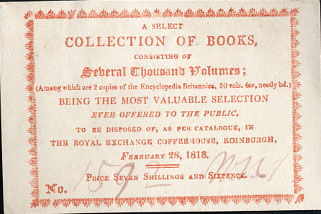
Illustrated above is an uncommon survivor of the book trade: an entrance ticket to a general sale of “several thousand volumes” in Edinburgh in 1818.
Unsold stock is the bane of any bookseller. In this case William Nivison put up for sale at the Royal Exchange Coffee House not only single copies of timely books, such as the London, three volume edition of Lewis and Clark’s Travels, but also offered titles in bulk, such as “100 (copies) Burns’s Works, 4 vol. 12mo, calf, titled, [individually priced at] £1, 6s.” He sold more than books, for the catalogue includes such items as drawing boxes at different prices (at 2s, 6s, 10s, and “complete” at £1, 10s), drawing pencils, quills, “maps published within these last 12 months,” and “Church Music Tunes.”
The 2645 volumes and other items in the 11 page catalogue are listed and priced. How did his prices compare with the market? One case in point may well tell the story of the whole. Nivison offers Hannah More’s Sacred Dramas at 3s 6d in calf. An 1815 Scottish advertisement for this same book offered it at 6s in boards. The price differential may give us a clue as to why Nivison was charging admission to the sale (price on the ticket “seven shillings and sixpence.”) He was underselling the trade, which had several consequences. On the one hand, as his prices approached his cost for stock, it meant slim profits per unit. On the other hand, there was money to be made, because profit could be had from the gate fee charged to the bargain hunters coming to his sale. Nivison realized there was value not only in the stock offered but in the event itself. He did not overlook putting a fee to a customer’s opportunity.
But, were there all that many customers? This ticket is number 1592. If it is indeed the 1,592nd ticket sold, then, he would have grossed £597. (He gave £991 as the total value of the stock on sale.) We will never know, perhaps, the final outcome of Nivison’s sale, but, it is recorded “In October 1819, [the Edinburgh Booksellers Society] … was exercised by the ‘system of underselling [that] has prevailed for some time in the Book Trade of Edinburgh.’ ” (p. 138, Edinburgh History of the Book in Scotland [2007], vol. 3)
